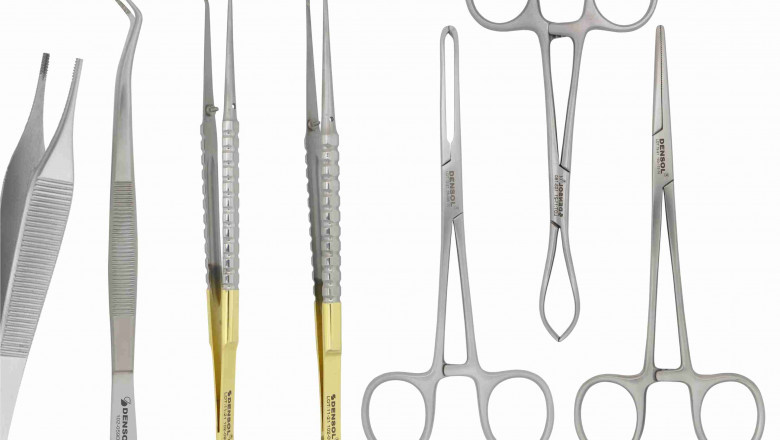views
Surgical Suture Kit
A Surgical Suture Kit is an essential toolset for medical professionals, first responders, and even individuals trained in emergency medical care. These kits are designed to facilitate wound closure, ensuring proper healing and reducing the risk of infections. Whether used in clinical settings, during emergency situations, or as part of a first-aid kit for outdoor enthusiasts, a well-assembled suture kit can be a lifesaver.
What is a Surgical Suture Kit?
A surgical suture kit is a compact package that contains all the necessary tools and materials to close wounds through stitching. These kits are designed to be portable, sterile, and convenient, allowing healthcare providers to perform suturing procedures efficiently.
Components of a Surgical Suture Kit
While the exact contents of a suture kit may vary depending on the manufacturer and intended use, a typical kit includes the following items:
- Surgical Sutures: These come in various types, including absorbable (e.g., catgut, polyglycolic acid) and non-absorbable (e.g., nylon, polypropylene). They may be attached to needles of different sizes and shapes to suit different wound types.
- Needle Holder: A specialized tool designed to securely grip and guide the needle during the suturing process.
- Scissors: Small, sharp scissors for cutting sutures and trimming loose threads.
- Forceps (Tweezers): Used to handle tissue and hold skin in place during suturing.
- Scalpel: Sometimes included for wound debridement or creating incisions.
- Antiseptic Swabs: To sterilize the wound area before suturing.
- Gloves: Sterile gloves to maintain hygiene during the procedure.
- Sterile Drapes: Used to create a sterile field around the wound.
- Wound Irrigation Syringe: For cleaning debris or bacteria from the wound before stitching.
- Instruction Manual: Some kits include a guide for those who may need additional instructions for use.
Types of Surgical Suture Kits
Suture kits are available in various forms tailored to specific needs:
1. Basic Suture Kits
- Ideal for beginners or for emergency preparedness.
- Contains essential tools like sutures, forceps, and scissors.
2. Advanced Surgical Suture Kits
- Designed for professionals in clinical settings.
- Includes high-quality instruments, multiple suture types, and additional tools like scalpels and wound irrigation syringes.
3. Practice Suture Kits
- For medical students and training purposes.
- Comes with synthetic or foam practice pads that mimic human skin, allowing users to refine their suturing skills.
Uses and Applications
Surgical suture kits are versatile tools with multiple applications:
1. Medical and Clinical Use
- Used by doctors, nurses, and surgeons to close incisions or traumatic wounds in sterile environments.
2. Emergency Situations
- First responders and paramedics rely on suture kits to treat severe injuries in the field.
3. Outdoor and Survival Scenarios
- A critical part of survival kits for hikers, campers, and adventurers who may face injuries in remote locations.
4. Educational Purposes
- Practice kits are widely used in medical schools and training programs to teach suturing techniques.
Benefits of a Surgical Suture Kit
- Portability: Most kits are compact and lightweight, making them easy to carry in emergency bags or first-aid kits.
- Sterility: Ensures that wounds are closed in a clean environment, reducing infection risks.
- Convenience: Contains all necessary tools, eliminating the need to gather individual components during emergencies.
- Versatility: Can be used for a variety of wound types and situations.
How to Use a Surgical Suture Kit
Using a suture kit requires proper training and practice to ensure safe and effective wound closure. Below is a general overview of the steps involved:
- Assess the Wound: Determine if suturing is necessary. Deep, open wounds may require stitches, while minor cuts might heal with adhesive strips or glue.
- Prepare the Area: Clean the wound with antiseptic and irrigate it to remove debris.
- Set Up a Sterile Field: Use sterile gloves and drapes to prevent contamination.
- Choose the Appropriate Suture: Select the right needle and suture type based on the wound's location and depth.
- Suture the Wound: Use the needle holder to pass the needle through the skin, ensuring even tension across the wound edges.
- Tie Off the Sutures: Knot the thread securely to keep the wound closed.
- Trim Excess Thread: Cut off the remaining thread with scissors.
- Monitor for Infection: Keep the wound clean and watch for signs of infection or complications.
Choosing the Right Suture Kit
When selecting a surgical suture kit, consider the following factors:
- Intended Use: Is the kit for professional, emergency, or practice use?
- Quality of Tools: Look for durable, medical-grade instruments.
- Variety of Sutures: Ensure the kit includes a range of suture types and needle sizes.
- Sterility: Check that the kit is sterile and sealed.
- Portability: Choose a compact design for easy storage and transport.
Maintenance and Storage
To maintain the integrity of your surgical suture kit:
- Store it in a cool, dry place.
- Check expiration dates on sutures and antiseptics.
- Replace used or expired components promptly.
- Ensure the kit remains sealed and sterile until needed.
Conclusion
A surgical suture kit is an invaluable tool for anyone trained in wound care, from healthcare professionals to outdoor enthusiasts. With the right tools, proper training, and adherence to hygiene protocols, these kits can save lives by ensuring timely and effective wound closure. Whether for emergencies, clinical procedures, or practice, investing in a high-quality suture kit is a wise decision for preparedness and peace of mind.






















Comments
0 comment